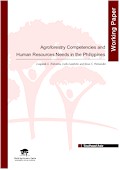| Working Paper Series |
 |
|
| Title | Agroforestry competencies and human resources needs in the Philippines | | Author | Lutgarda L. Tolentino, Leila Landicho and Jesus C. Fernandez | | Year | 2010 | | Publisher | World Agroforestry Centre - ICRAF, SEA Regional Office | | City of Publication | Bogor, Indonesia | | Series Number | Working paper no 99 | | Number of Pages | 21 | | Call Number | WP0133-10 | | Keywords | agroforestry education, agroforestry competencies, agroforestry human resources needs, Philippines |
|
| Abstract: |
Although enrollment in agroforestry has been declining in the Philippines, there has been a growing demand for a competent pool of human resources in this field. This is because agroforestry has been recognized as a major component in most institutional programs of national and local development organizations in the country. In the next 10 years (i.e., 2009-2019), these organizations would likely employ about 1, 284 agroforestry graduates (or about 128 graduates per year) to help carry out their
institutional programs. Foremost of the specific competencies needed are: community organizing for agroforestry development (i.e., from production, harvesting, processing, to utilization, marketing, and conservation practices), training and extension, preparation of feasibility studies on agroforestry development; land capability assessment for sound agroforestry technologies, and identification of appropriate and site-specific species and cropping combinations. These competencies are expected to
ensure a more effective and efficient implementation of upland development programs in the Philippines particularly in the areas of climate change mitigation and adaptation and provision of livelihood opportunities.
At present, most national and local line agencies and development organizations avail themselves of such manpower requirement by tapping external experts and/or by retooling their existing staff through short-term training programs and mentoring. The Philippine Agroforestry Education and Research Network (PAFERN) and the National Agroforesters’ Association of the Philippines (NAAP) are expected to play key roles in creating continuing formal and informal education activities and enhancing the necessary linkages to meet the agroforestry competency requirements of organizations engaged in agroforestry development in the country. |
|
|
Download file(s): Click icon to download/open file.
|
| |
File Size |
Description |

|
1,036 KB |
Softcopy |
|
|
GRP 6: Developing policies and incentives for multifunctional landscapes with trees that provide environmental services
|
| Viewed in 2680 times. Downloaded in 912 times. |